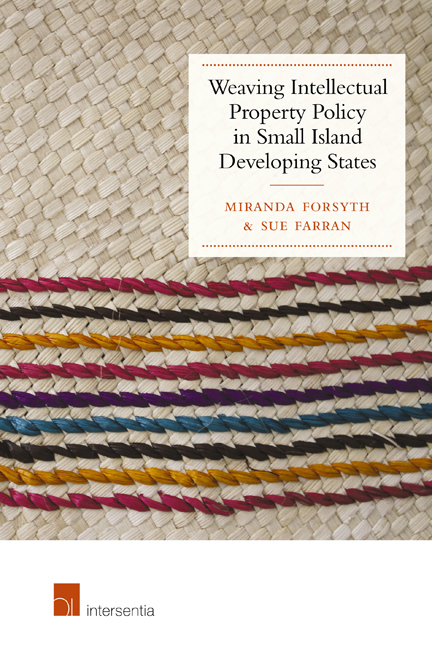Book contents
- Frontmatter
- Dedication
- Acknowledgements
- Contents
- List of Tables
- Introduction
- Chapter 1 Intellectual Property and Development: The Issues Viewed through a Pacific Islands Prism
- Chapter 2 Health and Issues of Access to Medicine
- Chapter 3 Access to Educational Resources
- Chapter 4 Problems with Importing the Global Intellectual Property Regime into Pacific Island Countries: Learning from Land
- Chapter 5 Setting Out a New Approach to Intellectual Property and Development
- Chapter 6 Intellectual Property and Technological Innovation in Pacific Island Countries: The Example of Sustainable Sea Transport
- Chapter 7 Branding, Certifying and Authenticating in Pacific Island Countries
- Chapter 8 The Regulation of Traditional Medicinal Knowledge in Pacific Island Countries
- Conclusion
- About the Authors
Introduction
Published online by Cambridge University Press: 22 November 2017
- Frontmatter
- Dedication
- Acknowledgements
- Contents
- List of Tables
- Introduction
- Chapter 1 Intellectual Property and Development: The Issues Viewed through a Pacific Islands Prism
- Chapter 2 Health and Issues of Access to Medicine
- Chapter 3 Access to Educational Resources
- Chapter 4 Problems with Importing the Global Intellectual Property Regime into Pacific Island Countries: Learning from Land
- Chapter 5 Setting Out a New Approach to Intellectual Property and Development
- Chapter 6 Intellectual Property and Technological Innovation in Pacific Island Countries: The Example of Sustainable Sea Transport
- Chapter 7 Branding, Certifying and Authenticating in Pacific Island Countries
- Chapter 8 The Regulation of Traditional Medicinal Knowledge in Pacific Island Countries
- Conclusion
- About the Authors
Summary
This book is about the development of intellectual property policy in small island countries and less and least developed countries. It sets out the case for the importance of making respect for local context a central principle, and the consequent need to weave together an intellectual property regime based on both local and international regulatory systems. It also discusses in practical terms how this can be achieved, providing a range of case studies based on empirical research over a number of years in the Pacific islands region, in which many small island developing states are based.
Intellectual property rules are deeply implicated in almost every area of development, and as such are best addressed in a holistic way within the particular developmental agenda of individual states. However, intellectual property laws and frameworks have developed in such a complex and technical way over the past few decades that the policy issues they entail remain virtually inaccessible to all but specialist intellectual property experts, to whom they tend to be relegated. This is particularly problematic in small island and less developed countries where technical capacity is extremely limited due to small and dispersed populations and under-developed educational, training and research institutions. It has meant that this area of development is regularly overlooked. Although the last decade has seen both a rise in academic attention to the nexus between intellectual property and development and, in 2007, formal commitment by the World Intellectual Property Organisation (WIPO) to the ‘Development Agenda’, the majority of the work to date has focused on technical details about isolated pockets of concern, such as pharmaceutical patents and access to knowledge. In general, this has been carried out by lawyers, and as such it has tended to concentrate on the details of state legislation and international treaties. As we shall point out, while these forms of intellectual property regulation have their place, they also have their limits.
Although also written by lawyers, this book takes a somewhat different approach to the issues involved in intellectual property and development.
- Type
- Chapter
- Information
- Publisher: IntersentiaPrint publication year: 2015



